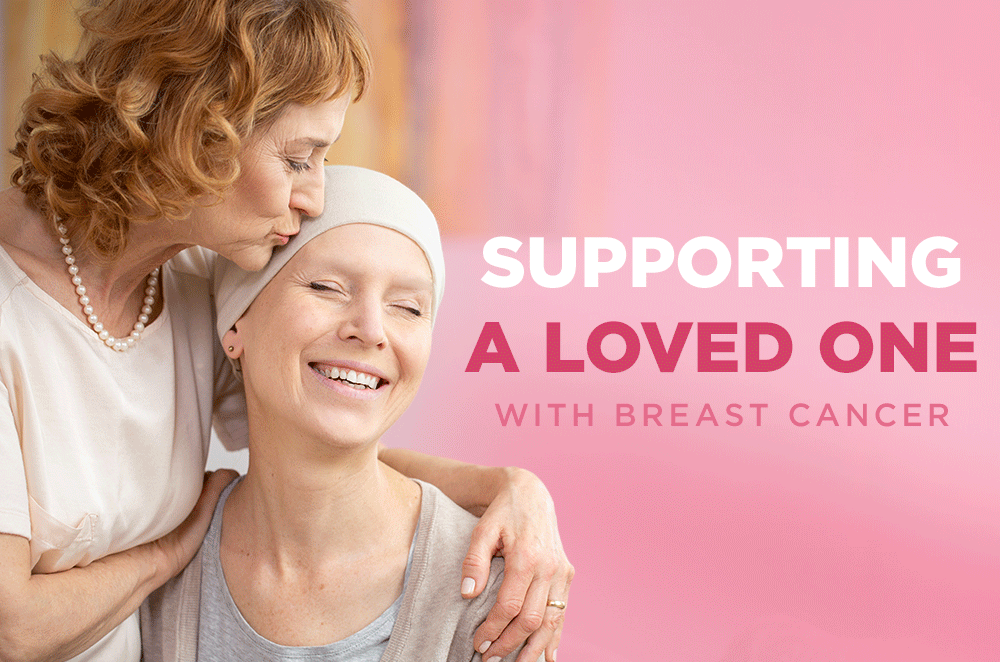A breast cancer diagnosis changes everything, not just for the patient, but for everyone who loves them. We know that as a family member or friend, you play a vital role on the care team. If you are supporting someone through this journey, you’re an absolute champion. However, it can be tough to know what to say or do. Therefore, we offer this guide with practical, heartfelt advice on how to provide the best support while ensuring you also take care of yourself.
Offer Emotional Support
When your loved one faces breast cancer treatment, they need to feel seen, heard, and loved, without any added pressure. First and foremost, your emotional presence makes a real difference.
Listen More Than You Talk: The best thing you can do is often just be a quiet presence. You must resist the urge to offer advice, share stories about other people’s cancer, or use forced positivity. Instead, let them feel their feelings—whether that’s sadness, anger, or fear. Simply say, “That sounds really hard,” or “I’m here for you, no matter what.” This powerful acknowledgement helps.
Acknowledge the Situation Directly: Although it might feel awkward to bring up the diagnosis, avoiding it can make your loved one feel isolated. Try simple, caring statements like, “I’m thinking of you,” or “How are you feeling today?” Furthermore, you must follow their lead; if they don’t want to discuss it, that’s perfectly fine.
Keep the “Normal” Going: Breast cancer can easily take over a person’s life. Consequently, you should make an effort to talk about everyday things—sports, a funny show, or family news. Shared laughter and connection over “normal” life provide a much-needed break from the medical world.
Respect Their Decisions: Your loved one must make many choices about their treatment. Even if you disagree, remember that it is their body and their journey. Your role is to support them, not to manage their care plan.
Practical Ways to Provide Help
Treatment side effects, like fatigue and nausea, often make everyday tasks feel impossible. To help effectively, offer specific, concrete tasks rather than the vague, “Let me know if you need anything.”
Organize the Meal Train: Cooking quickly becomes exhausting. Therefore, you should organize a meal delivery schedule with friends, or simply drop off groceries. Remember to always ask about their appetite or any dietary restrictions before you cook.
Run Essential Errands: Offer to take on simple chores: You can pick up prescriptions, walk the dog, take the kids to practice, or tackle the laundry. These small acts offer massive relief.
Be the Appointment Buddy: Medical appointments are overwhelming, presenting complex information. So, volunteer to go with them. Your job is not just to drive, but to take notes and help them remember what the doctor said.
Handle Home and Yard Care: Offer to mow the lawn, shovel snow, or assist with light cleaning. A comfortable, clean environment positively impacts their mood, and you handle a physical chore they can’t do themselves.
Caregiver Self-Care
You cannot pour from an empty cup. To clarify, you must take care of yourself to be a strong, steady source of support. This is essential for your own well-being and for the quality of the care you provide.
Acknowledge Your Own Feelings: It is completely normal to feel overwhelmed, anxious, scared, or even guilty. Therefore, don’t bottle these feelings up. Find a trusted friend, family member, or professional counselor to talk to. For example, many cancer organizations offer support groups specifically for caregivers—connect with people who truly understand the experience.
Set Firm Boundaries: Caregiving is draining. Consequently, learn to say “no” to extra commitments and actively carve out time for yourself. This might involve a 30=minute walk, reading a book, or meeting a friend for coffee (and agreeing not to talk about cancer). This necessary break will refresh you.
Prioritize Your Health: You must maintain your own healthy habits: eat nutritious food, get enough sleep, and keep up with your own medical appointments. Remember always, you’re running a marathon, not a sprint.
Delegate and Accept Help: Just like your loved one, you don’t have to do it all alone. When others offer assistance, accept it! Delegate tasks and share the load.
The Essential Role of Support
We are incredibly grateful for the compassionate care you provide. Ultimately, the journey through breast cancer is a team effort. By giving your emotional presence, your practical assistance, and your commitment to self-care, you offer some of the most important medicine of all: unconditional love and support.
Resources:
https://www.breastcancer.org/about-you/caring-for-someone
https://www.cancer.org/cancer/caregivers/how-to-be-a-friend-to-someone-with-cancer.html
Disclaimer:
The Comanche County Memorial Hospital website does not provide specific medical advice for individual cases. Comanche County Memorial Hospital does not endorse any medical or professional services obtained through information provided on this site, articles on the site or any links on this site.
Use of the information obtained by the Comanche County Memorial Hospital website does not replace medical advice given by a qualified medical provider to meet the medical needs of our readers or others.
While content is frequently updated, medical information changes quickly. Information may be out of date, and/or contain inaccuracies or typographical errors. For questions or concerns, please contact us at contact@ccmhhealth.com.

